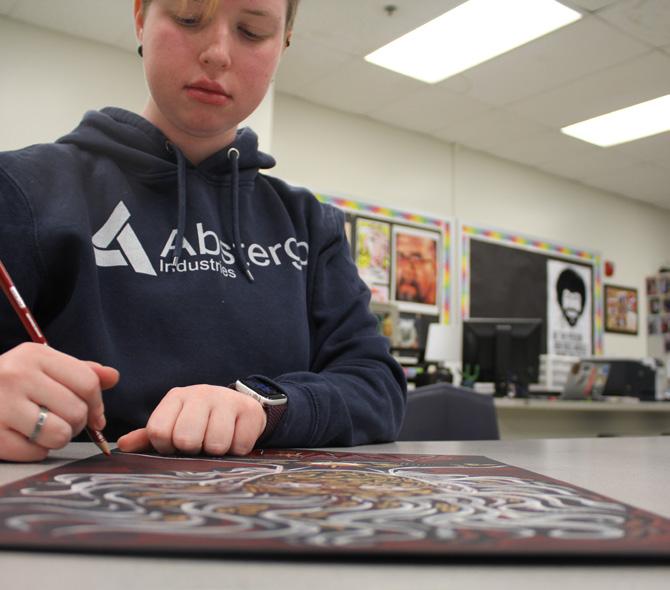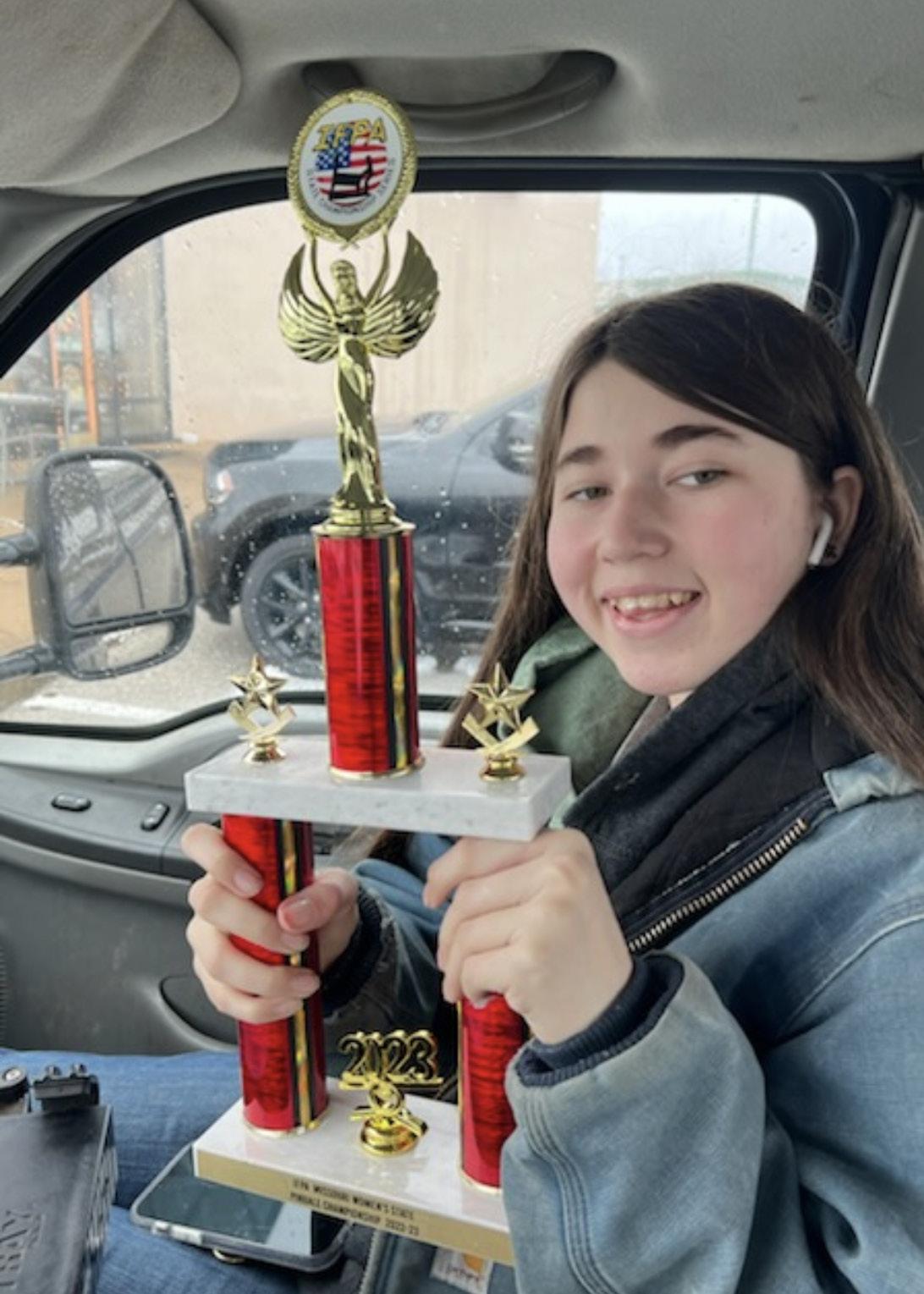IS IT RECYCLABLE?




7 objects shown here are recyclable. Check off the ones that you think are. Read the full story on pgs. 8-9, and look to see if your answers are right.










MESSENGER the n. VI VOLUME XXX, ISSUE VI | MO 63017 | MARQUETTEMESSENGER.COM | MARCH 2023
The 19th century recreational sport of pinball becomes a competitive sport for students. See full story on pg. 16.


The theater stage will undergo renovations this summer in addition to the parking lot and other structures. See full story on pg. 5.
ROLL CALL
Editor in Chief
Associate Editor Copy Editor Online Editors
Production Editor News Editors Features Editor
Arts & Entertainment Editor Sports Editors
Opinions Editor Illustrator
Business Manager
Social Media Editors

Staff Reporters Staff Adviser
Aarushi Bute
Akhila Swarna
Anika Talyan
Rue Siddiqui
Prashu Sidella
Pranav Sriraman
Annabelle Miller
Parker Brandt
Anvi Talyan
Shyam Punnachalil
Jacob Robinson
Liza Cooper
Emma Tyulyayev
Aubrey Lacavich
Brie Inman
Elliott Jorgensen
Annie Alcorn
Aiden Burkhardt
Jack Cason
Emily Chien
Brooke Eck
Willem Hummel
Kate Jesperson
Claire Lowder
David Moss
Justin Small
Emily Jorgensen
03 PRINCIPAL ACCEPTS DISTRICT ROLE

Principal Dr. Steve Hankins will serve as assistant superintendent of student services.
06 RISE IN EGG PRICES
Chicken owners reflect on the benefits of owning chickens with the increase in egg prices.

10 ARTIST OF THE MONTH
The title “Artist of the Month” recognizes talented students for their artistic work.
13 YALE’S HAPPINESS CLASS

Messenger staffer reviews Yale’s “The Science of Well-Being” course taught by professor Dr. Laurie Santos.

14 COMBAT SPORTS
Students participate in combat sports specifically wrestling and fencing.


Photographs by Liza Cooper, Nevaeh Kerber, Tiona Merritte, Shyam Punnachalil, Jacob Robinson, Prashu Sidella, Anvi Talyan

Front page photographs by Aarushi Bute
ABOUT US
The Messenger is a public forum, published eight times a year by students in the News Production class at Marquette High School, Chesterfield, MO, 63017. The publication serves to inform readers about issues concerning the community.

Opinions of Messenger columnists or the Editorial Board are not representative of the opinions of the entire Messenger staff or the administration. The full student publication policy can be viewed on the Messenger official website, marquettemessenger.com.
The Messenger takes responses for any issue. Send these to yourmhsnews@gmail.com. The Messenger reserves the right to edit submitted material and to refuse to print material because of space limitations, repetitive subject matter,


libelous content or any other reason the editor in chief and adviser deem appropriate, including advertisements and letters to the editor.
The Messenger is nationally recognized as a member of the National Scholastic Press Association (NSPA), Columbia Scholastic Press Association (CSPA), the Journalism Education Association, Missouri Journalism Education Association and Quill & Scroll. This year, the publication was named a Hall of Fame recipient and Quill & Scroll George H. Gallup award winner. Past issues have been named NSPA Pacemaker finalists and CSPA Crown finalists. The Messenger website is a Distinguished Site recipient. The publication office is located in Room 226, (636) 891-6000 ext. 26228.
INSIDE
PREVIEW ONLINE 03 10 14 13
@MHSNEWSPRODUCTIONS @MARQUETTEMESSENGER @YOURMHSNEWS 06
MHSNews | Local Coffee Shop Features Fairy Tale Decor by | Linds Avalos MHSNews| A Deeper Conversation about Diversity by | Chloe Schmitt
Dr. Hankins accepts new position
prashu SIDELLA
The Board of Education has approved the hiring of Principal Dr. Steve Hankins as the assistant superintendent of student services, beginning July 1. Dr. Hankins is replacing Terry Harris, who resigned in January.
This new role encompasses various jobs such as dealing with residency, nursing, guidance and even social work. The main goal is to provide the services students need to succeed.
“I have always loved being the principal of MHS, but this is also an opportunity to impact the district hopefully in a wider and positive scope,” Dr. Hankins said.
This is Dr. Hankins’ fourth year as the head principal. Previously, he was associate principal for four years, an assistant principal for six years and even taught here as a social studies teacher for 10 years before that.

He said his time at MHS has been an unbelievable experience that has caused him to grow as a leader.
“This really has been home for me for so many years. It’s hard to leave this school to an extent, but I’m still around, so they’re not gonna get rid of me altogether,” Dr. Hankins said.
Anya Moola, junior, echoed that Dr. Hankins has led the school through many difficult situations including the COVID shutdown, virtual learning and the loss of students and a principal.
“I think he has made a huge impact and the school will not be the same with him gone,” Moola said.
Even though not every student can personally talk to Dr. Hankins on a regular basis, Moola said, everyone still feels his presence.
Senior Principal Dr. Rick Regina has worked closely with Dr. Hankins since the 2000s.
“It’s been great working with Dr. Hankins. His door is always open,” Dr. Regina said. “Anytime I have a question, he’s responsive and very collaborative.”
Dr. Regina said Dr. Hankins is a great leader, good teammate and always open for advice.
“That part makes me a little sad, that I won’t see him every day, but I’m happy for him and I know that he’s only a phone call away,” Dr. Regina said.
Dr. Hankins would like the MHS community to
focus on the good ahead.
“There’s always gonna be hard times, there are always gonna be setbacks. If that’s where your focus is, you’ll never move forward,” Dr. Hankins said. “So this staff, this community, these parents, these students, they’re resilient. So just keep your focus on what’s ahead and know that you can get through anything.”
Alumnus proposes Parents’ Bill of Rights Act
aarushi BUTE
MHSgraduateSen.AndrewKoenig,R-Manchester, wantsmoretransparencyinpublicschools.
Inordertomakethishappen,Koenigproposed SB4onTuesday,Feb.14, whichmodifiestransparencyinpublicschoolsandcreatestheParents’Bill ofRightsActof2023,passedthroughtheMissouri Senate.AsofMarch2,thebillisstillintheHousefor asecondread.
SB4restrictstheteachingofcertaindiversity-relatedcontentwhilealsomakingallmaterialsrelated tothecurriculumavailabletothepublic.
TheMessengercontactedKoenigseveraltimes foraninterviewwithoutsuccess.
ClaireeceCross,senior,saidshedisagreeswithincreasedparentinvolvementwithinschoolsandSB4.
“Whenyougetparentsmoreinvolvedinkids’ learning,you’regivingup[students’]righttofigure outwhattheywanttodo,”Crosssaid.“[Parents] havealreadygottenaneducation.It’soureducation thatweneedtotakecontrolof.It’snottheirchoice.”
CrosssaidsheattendedtheThursday,Oct.20, Boardmeetingtoprotestthedefundingofthree programsforBlackstudents.Duetothetenseenvironment,Crosssaidshehasnoplansofattending anothermeeting.
“Itrynottogettooinvolvedwhenitgetstoparents,”Crosssaid.“IleftearlyafterIspokebecause Iwasnervousthatsomethingmighthappenafterwards.Itwasverynerveracking.Idon’twanttoget attacked.”
JessicaRisenhoover,MHSparent,saidtheParents’BillofRightswillhavenoeffectonRSDeducationasthedistrictalreadypushesouttransparency.
usmoneyforthoseadditionalmeasuresandjust doesn’tmakesense.”
Risenhooversaideducationhasbeenlaunched intoaculturewarthat’sbeingusedforcampaign donationsandpoliticalgain.
Asaparent,Risenhooversaidshebelievesinparentinvolvementbutintheroleofvolunteer.
“Ifyoujustshowedupandvolunteeredatyour child’sschool,youwouldknowexactlywhat’sgoing on,”Risenhooversaid.“We’llcreatethesethingsfor peoplewhoaren’tevengoingtolookatit.”
“Transparency and the ability to see curriculum for a class or teacher already exists,” Blakely said. “This legislation is asking teachers to take away much-needed instruction time from students to package together information for a statewide database that may or may not be accessed by parents.”
Instead, Blakley said parents should interact more with their children’s teachers.

“Teachers welcome positive, constructive parental interaction, and it serves a more immediate purpose of helping students succeed,” Blakley said.
Language arts teacher Jordan Shelton, Rockwood National Education Association’s (RNEA) representative, said she speaks with students and teachers about potential improvements and relays it to the executive board in order to best support the community.
Shelton said she encourages parent involvement in the classroom and wants to see them regardless of if the bill passes. But, her one concern rests in the restrictions in diversity, she said.
“As one of the Diversity, Equity & Inclusion (DEI) champions in the building, I don’t know how we will continue that work in the way that it needs to be done to best help our students if we’re not able to talk about diversity and inclusion and the key components of that work,” Shelton said.
In her Career, Communication & Composition class, Shelton said she has a unit built around DEI in the workplace as those initiatives happen in the biggest companies in the St. Louis area.
“Icanalreadygoonlineandseethecurriculum.It’s
StacyBlakley,MissouriStateTeachersAssociation(MSTA)president,saidthebillwouldhaveno positiveimpact. allthere,”Risenhooversaid.“Sothat’sgoingtocost
“In order to prepare our seniors to go into a world that is going to be filled with many different types of people, we need to be able to talk about these things,” Shelton said. “Teachers should be trusted to handle those conversations tactfully and carefully because that’s what we’ve been trained in.”
NEWS 3 issue VI
Activities Director Adam Starling, Principal Dr. Stephen Hankins and Freshman Principal Kyle Devine talk in the Commons during lunch. Next year, Dr. Hankins will be taking a new position as assistant superintendent of student services. Photograph by Prashu Sidella
Jordan Shelton’s 10th grade language arts class reads during 4th hour. SB 4 including the Parents’ Bill of Rights will modify transparency in curriculum and place requirements on diversity-related content. Shelton said she has a unit dedicated to diversity in the workplace in her Cooperative Career Education class. Photograph by Pranav Sriraman
Parking lot entrance to be added next year
kate JESPERSON • annabelle MILLER
As Natalie Danner, junior, walks out to her parking spot, she sees the long line of students aggressively trying to drive out of the parking lot.

“I would literally have to scramble and sprint to my car if I wanted to get out on time,” Danner said.
Students cut Danner off as she tries to leave the parking lot, often trapping her in her space as cars line up for at least 10 minutes.
It takes Danner about 20 minutes to exit the lot while her brother, freshman Joey Danner, makes it home on the bus before her.
To address this problem, a new entrance will be added to the parking lot this summer to be open next school year.
A small section of road will be built to connect the upper part of the parking lot to the Clarkson Road entrance, sophomore Principal Dr. Dan Ramsey said. The project will cost $20,000 to $30,000.
The new road will serve as the only entrance to the parking lot, and the current entrance will be used exclusively as an exit.
During dismissal, parents can enter the lot through the new entrance, Dr. Ramsey said, and then drive toward the football field for pick up. The new road will take traffic pressure away from the bottleneck exit nearest to Clarkson Road.
exit to the lot during dismissal times, Sophomore Principal Dr. Dan Ramsey said. Photograph by Annabelle Miller. Illustration by Emma Tyulyayev
“People can’t seem to turn in and turn out of there at the same time,” Dr. Ramsey said.
Dr. Ramsey said the idea came to him during freshman parent orientation four years ago, and he has fought for the update since.
“It will totally change the traffic next year,” Dr. Ramsey said.
Zach Tracy, senior, has been navi-
gating the parking lot for two years.
“If I’m not one of the first ones out there, I’m just stuck there until everyone else is out,” Tracy said.
The new entrance, he said, will help decrease congestion and get everyone out of the parking lot quicker.
“It makes it easier for a lot to have that second option to enter,” Tracy said.
Additional Summer Renovations
Theater stage floor
A new stage will be built starting June 1 for the first time in more than 20 years It will be an estimated $40,000; the bids are still being worked out. The stage will be mainly sponsored by the theater parent organization.
Front bridge redone
The concrete bridge leading to the main entrance will be completely redone this summer. Principal Dr. Steve Hankins said this will address safety concerns with the bridge.
Second and third floor bathrooms
The social studies and math wing bathrooms will be redone to match the science and language art wing bathrooms over the summer.
New flooring in multipurpose room
The multipurpose room located near the weight room will get new flooring, which Dr. Hankins said was long overdue.
Student enrollment drops to lowest in five years
As the 2023-24 school year approaches, many students and staff members have noticed a drop in student enrollment in the last four years.
When the Class of 2023 first became MHS students in 2019, the student population was 2,403. Next year, an expected 2,130 students will be enrolled at MHS.
The total number of elementary school students will decrease by 114 next year, and the number of high school students will decrease by 130.
This decline has been a district-wide trend said Daniel Steinbruegge, director of finance.
19,886 students are currently attending an RSD school this year, but this number will decrease by 255 students next year and continue to decrease, according to enrollment projections.
The drop in student enrollment will cause a $6 million decrease in state funding by 2024, Steinbruegge said.
“The district is in a healthy operating financial position to limit any shortterm financial changes,” Steinbruegge said. “However, when enrollment decreases we may have to adjust building staff through means of attrition.”
This gradual release of staff causes concern for Scott Szevery, social studies department chair.

“When you lose a teacher, class sizes will go up even if you lose 100 students along with them,” Szevery said.
As department head, Szevery said a big task for him next year will be keeping class sizes under control because of the enrollment decrease.
2,130 students are enrolled at MHS for the 2023-24 school year
273 student decrease since 2019-20 school year
6 million
expected decrease in funding by 2024-25 school year due to drop in enrollment
Steinbruegge said the biggest impact this drop will have is on the district’s budget. The district is reimbursed based on the Average Daily Attendance (ADA) of students.

“This isn’t a surprise because you can track these trends with birth rates and middle school attendance, so we’ll plan for it,” Szevery said.

Principal Dr. Steve Hankins said the drop in enrollment is just a return to normal.
“Historically, Marquette has stayed around 2,000 students until we had
a spike four to five years ago,” Dr. Hankins said.
MHS Registrar registrar.
Last year’s and this year’s senior classes were some of the largest in MHS history, Dr. Hankins said, and this contributes to the decrease in the student population.
The class of 2023 is made up of 593 seniors, but there are only 560 incoming freshmen, according to the
Dr. Hankins said he won’t know until later this year whether staff will need to be reorganized to fit the new student population.
“When the number of students goes down, the number of staff goes down, but we can’t make any projections yet,” Dr. Hankins said.
4 NEWS march 2023
This photo illustration depicts what the new entrance into the student parking lot could look like. The road will be built over the summer, and it will connect the Clarkson Road entrance to the upper part of the parking lot. The road will help relieve the congestion near the
annabelle MILLER
The Class of 2023 is made up of 593 seniors, but for 2023-2024 there are only 560 incoming freshmen.
After the COVID-19 pandemic, academic dishonesty reached new heights, with teachers and staff reporting different methods and new technologies for cheating. With the return of in-person school, making changes to the district policy regarding academic dishonesty was revisited in the Rockwood Learning Council. Photo illustration by Parker Brandt
Academic dishonesty policy re-evaluated
After a hiatus due to the COVID-19 pandemic, The Rockwood Learning Council (RLC) has resumed brainstorming changes to the district’s academic dishonesty policy.
The current policy states that the district practices zero tolerance for academic dishonesty in any manner.
Principal Dr. Steve Hankins said the change, modeled after the tiered plagiarism policy, would designate different levels of punishment for different cheating-related offenses. Under the plagiarism policy, for example, a plagiarized piece can range from a completely copied-and-pasted paper to a misplaced quote or citation, two very different forms of plagiarism that result in different consequences.
“It really depends on what the infraction is,” Dr. Hankins said.
Dr. Hankins said properly educating and informing students of the district and school policies would prevent students, who would be otherwise innocent, from committing these offenses without knowing.
The concern for an increase in academic dishonesty was brought to RLC’s attention by the community pre-COVID but was put on hold after the district went virtual in the Spring of 2020. Although school
has since returned to in-person, the policy was not brought back into conversation until January 2023.
Dr. Hankins said RLC had these changes on their radar but decided to renew the policy’s discussion after the emergence of new technology available to students, like ChatGPT and Perplexity.ai.
sarily moving in the right direction.
“As technology keeps evolving, it’s hard for teachers to expect kids to not cheat,” Powitzky said.
Powitzsky said students have recently been exposed to more methods of cheating, especially due to online learning.
She said there are instances when cheating shouldn’t be punished as harshly as the current zero-tolerance policy warrants, but making exceptions may create loopholes for students to get through.
“I think it’s good to re-evaluate these policies and get student input,” Powitzsky said. “I honestly don’t think it will bring down the amount of cheating, though, because so many kids cheat anyway.”
“Even copying a homework assignment qualifies as academic dishonesty,” Dr. Hankins said. “Not all students recognize, or are made aware, that this constitutes as cheating.”

Dr. Shelley Willott, assistant superintendent of learning & support services, was contacted by the Messenger for comment, but said not much progress had been made on the policy, and she will have more information in April.
Gabriella Powitzky, Senior Class secretary, said that while the policy might need work, it isn’t neces-
Ashley Hobbs, social studies teacher, agrees that academic integrity is a pressing issue, but isn’t sure if a policy change is necessary.
“The only person who can compromise your academic integrity is yourself,” Hobbs said. “You either did the work yourself or you didn’t.”
Hobbs said applying focus on grades rather than learning only makes students more inclined to cheat.
“We would have less issues with academic dishonesty if we focused attention on more important things, like learning and retention, instead of achieving good grades,” Hobbs said.
Teachers push for campus voter registration

annie ALCORN • claire LOWDER
Civic Learning Week began this week, and teachers at MHS celebrated with voter registration for students.
The organization, Civic Learning Week, hopes to “highlight the importance of civic education in sustaining and strengthening constitutional democracy in the United States.”
On Tuesday, March 7, voter registration was avaliable to students during lunch shifts.
Scott Szevery, social studies teacher, urged RSD to reintroduce the availability of voter registration at MHS alongside the Academic Council (school staff responsible for final-decision making) and Partners In Education (PIE).
“It’s very easy to become distracted and forget to register to vote as a freshman or sophomore in college or not know how to vote from out of state,” Szevery said. “Making registration available to students before they graduate high school will put this on their radar a little earlier.”
Mahita Avasarala, senior, said providing the opportunity for eligible students to register to vote at school would be convenient.
April 4 BOE Election
Six candidates are running for three open positions.
• Karen Bachert
• Robert Cadigan
• Thomas Dunn
• Trisha Katzfey
• Lynne Midyett
• Richard Wierzba
Brendon Tognoni, junior, registers to vote for Civic Learning Week during lunch. A desk was placed at the front of the Commons for students who are 18 or will be 18 by Thursday, Sept. 7, to register. “We used to do voter registration years ago but it kind of fell by the wayside,” Scott Szevery, social studies teacher, said. Photograph by Pranav Sriraman
Avasarala is currently not registered to vote because she is still 17, but she plans on registering soon because she can at 17 ½.
With the General Municipal Election happening on Tuesday, April 4, which includes voting on three district Board of Education seats, Avasarala
said encouraging students to register in March is a smart choice.
“A lot of people don’t realize that voting in local elections is just as important as the presidential elections,” Avasarala said.
Echoing Avasarala, Jordan Shelton, language arts teacher, said stressing the
More information can be found on the RSD website
importance of voting to seniors entering adulthood has many benefits.
“It will show seniors that we think it’s very important that they participate in local government,” Shelton said.
“And, it lets them know that all community members should have a goal to be an active voter.”
issue VI NEWS 5
parker BRANDT • claire LOWDER
“As technology keeps evolving, it’s hard for teachers to expect kids to not cheat.”
Gabriella Powitzky, Senior Class secretary
Leap year babies legally celebrate in March
annie ALCORN
Last week, Kim Moon, language arts teacher, celebrated her birthday. This year, she will turn 6 and 3/4.
Moon was born on Feb. 29, 1996, which is a leap day. She said she has always celebrated on Feb. 28 because it is still in February, but her legal birthday is not until March 1 on a non-leap year.
“My dad refuses to tell me ‘happy birthday’ until March 1,” Moon said. “I actually love that he still does that.”
In elementary school, Moon said her classmates would make fun of her because she was always the youngest in the class and didn’t get a real birthday every year.
“But, once I got to middle school, everyone thought I was so cool,” Moon said. “So, I quickly learned to love my birthday.”
Except for having to wait an extra day to get her driver’s license when she turned 16, Moon said she has had no complaints about when her birthday is.
“It’s such a unique day that I don’t have to share with many people,” Moon said.
Lisa Moon, Moon’s mom, said her due date was actually a scheduled C-section surgery, but it was not intentional for it to fall on leap day. The doctor’s surgery day was Thursdays, and the surgery just happened to fall on Feb. 29.
“I had the choice of waiting another week, but that was not recommended,” Lisa said. “So, leap day it was.”
Kimberly’s brother and sister thought it was entertaining that she was born on leap day, Lisa said. Someone at the hospital gave the family frog pins to symbolize a new “leap” year baby in the family.
“It seemed unusual and fun,” Lisa said. “We really didn’t think ahead to some of the possible weirdness a leap year baby could entail.”
Like Moon, Caleb Walz, freshman, said he feels like he has a special connection with a lot of strangers that share his birthday, which is also on leap day.
“Not a lot of people are in this situation,” Walz said. “I guess it’s cool to meet other people with a leap year birthday.”
Since Walz only gets a “real” birthday every four years, he said his family celebrates him on two days every year, Feb. 28 and March 1. Walz goes out to dinner and opens presents on both days.
Because he was born in 2008, Walz has only celebrated on his actual birth date three times.

“I hate when people tell me I’m only 3 years old,” Walz said. “But, I don’t hate my birthday because it makes me unique.”
Chicken before the egg...
COVID, inflation prompt owners to expand their flocks
david MOSS
Zach Avila, architectural engineering teacher, had always thought about getting chickens.

“My wife and I had been discussing it forever,” Avila said. “We’ve also had friends and neighbors that have had chickens.”
About a year ago, Avila and his wife offered to “babysit” a friend’s two recently adopted chickens while they were out of the country. With the friend’s urging, this supposedly brief babysitting arrangement soon became permanent, and suddenly, the Avilas had chickens.
“We ended up with a total of five,” Avila said. “They’re all different breeds, so they’re different colors and easily recognizable.”
Within the last two months, Avila said all five hens–Cha Cha, Chicky, Lola, Lucy and Ruby–have been producing eggs. All together, the chickens lay four to five eggs each day, amounting to an average total of 30 eggs per week.
“Just out of curiosity, I’ll look at the price at the grocery store to see how expensive eggs are,” Avila said. “It is quite surprising that they’re two to three times more expensive than they used to be.”
Inflation and supply chain issues have been cited as contributing factors to the explosion in prices; however, the avian flu has been the primary factor, affecting nearly 60 million chickens, according to the U.S. Department of Agriculture.
son for this increase in egg orders.
“People were getting chickens because they always wanted to, and now they had time,” Watkins said.
This year, motivated by high egg prices in stores, Watkins said many existing customers decided to expand their flocks.
“It’s not necessarily new people. It’s people who come to take that next step from just raising chickens for fun, a hobby or for their own use,” Watkins said. “Now’s an opportunity for them to try to sell something and to supply neighbors with these eggs.”
5 Benefits of Owning Chickens
1. Fresh, healthy eggs everyday
2. Free fertilizerChicken manure is rich in nitrogen
3. Sustainable waste disposalChickens can be fed organic food scraps
4. Family friendly petsMany breeds are gentle and friendly
5. Natural pest controlChickens will eat grasshoppers, snails and other insects and critters
Information from Purina Farms
With egg prices jumping from under $2 at the start of last year to more than $4 this year, chicken hatcheries across the country have seen an increase in orders.
Tom Watkins, president of Murray McMurray Hatchery in Iowa, said they have had almost 1,000 phone calls a day.
About 75% of McMurray’s orders are placed online and the rest are placed over the phone. Collectively, Watkins said the hatchery has been placing roughly 1,000 orders for eggs each day.
Watkins said COVID-19 has been part of the rea-
Nevaeh Kerber, sophomore, has had chickens on and off since she was 6 years old. Her family now has seven chickens, along with the other animals on their farm including pigs, horses, bunnies, a goat, a cow, a donkey, giant tortoises, snakes, a fallow deer, a mini ostrich and a zebra.
“We started hatching eggs over COVID, so the chickens that we have now we actually hatched,” Kerber said.
Their chickens each produce an egg almost every day, which amounts to nearly 50 eggs weekly.
“We give a lot away because there’s just too many,” Kerber said. “The price of chicken food has increased, but we haven’t had to buy eggs, so that’s been nice.”
Chickens are not without their costs. Along with chicken feed, they also require scratch, a mixture of whole grains, seeds and legumes; grit, small rocks for digestion; oyster shells, a source of calcium and bedding for their coop that needs to be replaced consistently. All these costs combined can vary depending on breed of chicken.
Avila said his family’s primary motive is the joy that comes with raising them.
“For us, they’re just a bunch of pets,” Avila said. “I wouldn’t recommend chickens for anybody who just wants to save money. I’d recommend it if they like animals and want to grow their own food.”
6 march 2023 FEATURES
Kim Moon, language arts teacher, celebrates her fourth birthday, which was also the first time she celebrated on her actual birth date. “I always had to explain to my friends what a leap year birthday meant when I was younger,” Moon said. Photograph by Lisa Moon
tZach Avila, architectural engineering teacher, removes eggs from his chicken coop. He said he often has an abundance of eggs, and they usually give some away to friends and family. Photograph by David Moss
‘To not believe in aliens is ignorant’

willem HUMMEL
After the Chinese spy balloon was seen across the country, including in Chesterfield, and shot down over the Atlantic in February, more and more UFOs have been discovered around North America.
“Until we knew what it was, it was indeed a UFO, an Unidentified Flying Object,” said Earl Mullins, president and founder of The Space Museum and Grissom Center in Bonne Terre, Missouri.
Mullins actually saw the spy balloon and took pictures of it.
“The other objects, two or three that they shot down, I truly believe that they were as harmless as weather balloons,” he said. “When something like this happens, it heightens our curiosity, and so people start looking more, and they start seeing more things.”
Though many objects have a logical explanation such as with the Chinese spy balloon, others, like the gimbal objects that were discovered by the Navy, are harder to explain with our knowledge of physics.
Mullins is one of many people who entertain the idea that aliens might
exist. However, he said he would have to see it to believe it, or ample evidence of aliens would have to have been found, as he is a person of the Missouri “Show-Me State” mindset.

Mullins also said sentient, humanoid aliens would be improbable.
“For creatures like human beings to exist, we have to have a specific gravitational field.” Mullins said. “We have to be in what you call the Goldilocks Zone, and we are in our solar system–not too hot, not too cold. We also have to have the presence of water,” The sheer size of space also makes the likelihood of aliens coming to Earth improbable.
“Even the closest star to us, the Centauri system, is 4.3 light-years away,” Mullins said.
Nia Ovcharova, senior, said she fully believes aliens exist because of the vast amount of planets and galaxies there are.
“It’s huge. There’s no way there isn’t other life out there,” Ovcharova said.
Ovcharova said the recent UFO sightings are genuine alien sightings, or at least she prefers to believe they are.
“I don’t think I have actually seen anything concrete,” Ovcharova said. “I
think I’m just silly and delusional and believe in it.”
Zachary Cantor, senior, also believes aliens exist, but doesn’t necessarily believe they have come to Earth when humans were living here but he wouldn’t be surprised if an alien visited Earth at some point.
“There’s trillions of planets in our galaxy, and there are hundreds of trillions of galaxies, so I think to not believe in aliens is ignorant,” Cantor
said.


Cantor said he doesn’t think the recent UFO sightings were aliens.
“A UFO is just an unidentified object. It could be another country,” Cantor said. “Like I said, the universe is huge, so it would be pretty hard to spot an alien or for them to get to us in general.”
issue VI FEATURES 7
Illustration by Emma Tyulyayev
“There’s no way there isn’t other life out there.”
Nia Ovcharova, senior
Thank you to our Sponsors! Steidtmann Family Lowder Family Risenhoover Family Swarna Family Garre Family Kemp Family O’Shaughnessy Family Rashman Family Moss Family
District, community encourages educated Reduce. Reuse. Re-educate.
aubrey LACAVICH • david MOSS
While most students sit through their first hour class, Applied Skills students go classroom to classroom collecting the recycling bins.
Molly Straumann, Applied Skills teacher, is in charge of the program, along with teachers Eric Kipp and Molly Dilberto.
“It’s one job skill that the kids can consistently do every week,” Straumann said.
The students sort through the recycling after it’s collected and learn about what can and cannot be recycled. Non-recyclables in the blue bins are highly common, highlighting mis-education within the student population.
Outside of this recycling program, many other students and staff advocate for increased recycling.
Recycling at MHS
Zeenia Taraporevala, senior, is active in supporting recycling in different clubs such as the Environmental Club. She said recycling is a viable solution to reduce waste, but it still faces many challenges with reproducing used materials.
At MHS, the majority of classrooms have recycling along with trash bins. Despite this, many students are unaware of what can’t be recycled and sometimes throw away trash in the recycling bins.
Taraporevala said MHS should prioritize recycling education, and students should help with the recycling process at school.
Tanner Jesperson, senior, contributes to sustainability in his home by recycling.
He said there should be other options for waste disposal in the Commons and there should be more information around the building about what is able to be recycled. And, students should take this initiative.
“If we get the word out there and more people start to recycle, we can definitely create a positive change,” Jesperson said.
Logan Presnell, junior, said it’s also important
to reuse and repurpose materials because recycling plants can’t recycle everything.
“When you throw it away, there’s a 100% chance it’s getting burned or thrown into a landfill,” Presnell said. “When you recycle, you take a chance on someone actually repurposing this plastic, cardboard or paper to be used again.”
Kevin Koch, AP environmental science and geoscience teacher, said he sees a lot of students recycle in his classroom.
But, recycling should still be considered a last resort, he said. In his classroom, he encourages reducing and reusing materials first.
“When assignments are graded and given back, students can recycle it or they can reuse it,” he said. “They can use it as scratch paper.”
Koch said implementing a strong sustainability program at MHS would have to be a large, coordinated effort. The biggest challenge would be educating students and staff on what can and can’t be recycled.
Life After The Blue Bins
materials. Browne said about 40 years ago is when the demand for recycled materials increased and a nationwide industry developed.
The Hazelwood plant processes about 300 tons of material in 24 hours. Of this, about 19% is sent to the landfill, and the rest is recycled and transported to consumers to be reused.
Six workers sort out non-recyclable material and hazards. The average person does 30-45 picks per minute, grabbing selected material, while the machines do 1,000 picks per minute, Browne said.


“As technologically advanced as recycling has come over the past few decades and advances rapidly, people and human experience still play a role in the sorting process,” Browne said.

Once everything is separated, they are put in temporary storage until enough material is recovered to pack and transport to various buyers in the Midwestern area.
District-Wide Sustainability
Republic Services
Recycling at MHS goes through Republic Services, one of the leading environmental industries in America, with 71 locations, two located in the St. Louis area. The material recycled from MHS goes to the flagship location in Hazelwood.
Republic Services is a single stream material waste recovery facility. Jon Browne, recycling sales and account manager, is involved with the recycling process every step of the way.

“Here in Hazelwood, we are a material recovery center. We take in the material, process it, separate it from one another and recover that material for the secondary market,” Browne said.
Initially, recycling was on a local level, with volunteers who would collect and recover recyclable
Brenda Kirchhoefer, purchasing coordinator, plans the recycling budget for the district and pays Republic Services to pick up the recycling from each school. RSD paid Republic Services $60,793 this year for recycling.
“The goal is to recycle as much as possible,” Kirchhoefer said.
RSD does not compost in cafeterias. Only one company in the area handles composting from schools, and adding composting would be expensive.
“Would composting be great, yes, but do we have a plan in place, no,” Kirchhoefer said.
Despite this, other districts in the area have implemented sustainability programs, which offer disposal options for recycling and composting.
One of these districts is the Parkway School
Recycling Process
8 IN-DEPTH
The Hazelwood plant processes about 300 tons of material in 24 hours, with 19% of it sent to the landfill.
Recycled material starts on the floor in large piles, before it is scooped onto a conveyor belt.
After non-recyclables are removed, rotating disks latch onto the wider ends of the cardboard. The disks then push it onto another conveyor belt.
Next, once the paper is removed, magnetic processes remove metal materials from the plastics. Multiple machines separate the different types of plastics.
After glass is sorted, until enough material to different buyers
The Messenger visited Republic Services in Hazelwood to learn about the process of recycling and sorting different materials.
Information from Republic
Photo illustrations by Aubrey
Re-educate.
educated recycling
District. Lindsay Elliott, sustainability & energy coordinator at Parkway, said the district participates in composting through an outside service and uses a single-stream recycling service at each district building.
“Engaging in these sustainable behaviors from kindergarten through high school is a great way to build student confidence and willingness to continue into adulthood,” Elliott said. “I think that’s a huge benefit for our district.”
The biggest challenge the program faces is making sure all items are thrown away in the correct bins, Elliott said. Parkway has blue recycling bins and yellow composting bins to make them easily identifiable.
“I have a lot of gratitude for our custodians and other staff in our schools that help students divert their waste from landfills,” Elliott said. “They are a key component in our success.”
Elliott said everyone in the district needs to feel powerful in their ability to help the community’s environment.
“I hope other school districts see that diverting waste from landfills is an important, but feasible, way to engage students and staff in caring for the planet,” Elliott said.
Recycling Requirements
Republic Services has certain requirements for materials to be eligible to be recycled.


1. Size Requirements
Recycling has to be larger than a credit card. The diagram on the right is sized correctly for reference.
2. No Trash Bags
Any objects recycled cannot be in a bag, and they have to be loose in the bin.

3. No Food Grease
If there is food grease on the item, it is contaminated and can't be recycled.

4. Labels are Inconsequential
Labels and stickers don't need to be peeled off before recycling; item should be dry.



5. Keep Caps on Items



In order to pass the credit card rule, keep the cap on top of bottles.


As seen on cover, only these seven items can be recycled.


IN-DEPTH 9
sorted, the material is stored material is sorted to package in the Midwestern area.
Republic Services Aubrey Lacavich, David Moss and Emma Tyulyayev
Bute Plastic bottles/jugs
Is it Recyclable? Photographs by Aarushi
Flattened Cardboard Glass
Paper Metal Cans Cartons 6 Plastic numbered 1-7, except for 6, can be recycled Styrofoam is included in type 6 and cannot be recycled at Republic Services Yes No
Paper Food Boats (without contaiminants)
scraps Toys
bags
wrappers
Pencils Food
Dry erase markers Tissues Grocery
Snack
New art class emphasizes business skills
anvi TALYAN
With a small class of 10 students, Abbey Gradle, art teacher, has launched the first semester of the new Art & Design Applications class.
Similar to a business, students receive clients and create art for others instead of completing projects for themselves.
“It's more like if you were going to be a working artist,” Gradle said.
The class is currently working on decorating teachers' doors, creating a design based on teachers’ requests.
This assignment has been useful for Gradle as she said students are able to experiment with art mediums, allowing her to see the experience of each student.
Being a cheer coach, Gradle is often working on designing different shirts and logos for the team, along with being asked for favors by admin to design a variety of items.
“I really wanted to teach this class because honestly, this is a lot of what I do on a regular basis,” Gradle said.

She said having this class allows her to help those who ask her for those favors and allows artistic students to gain credit for their work.
“I think that it would be really fun for kids to take the class more than once because it’s always going to be something different,” Gradle said.
Lily McNulty, senior, heard about the class from Gradle during her Photography 1 class and joined after hearing about the business aspect of the class.

“If you want to do freelance illustration stuff, you have to know how to work with clients and how to be able to have your ideas mesh well with theirs,” McNulty said.
McNulty said she started doing commissioned work outside of school freshman year, mainly working with digital art. She finds the class useful, as she is planning on creating a career in art and studying graphic design in college.
“It's a very easy way to get experience in more of a low pressure environment,” McNulty said.
Lisa Del Pizzo, science teacher, was approached by McNulty and her classmate about their door decorating project.
She and fellow Anatomy teacher Marissa Gress decided they wanted to have their door reflect what they teach, so they chose a brain-themed door as they are focusing on the brain in their next unit.
“We just wanted to make something that people
smile and laugh about that is anatomy related
also just kind of funny and jovial,” Del Pizzo said.
Teacher highlights artistic talent emily CHIEN
Working with AP Art Studio students, Melisson Wilson, art teacher, has encountered many exceptional artists. After seeing EHS highlight their own student artists, Wilson started “Artists of the Month” as she believes talented artists deserve recognition for their work.

“We thought that was a great way to recognize some of our awesome artists that we have here at Marquette,” Wilson said. “This is something that we can kind of incorporate other non-seniors as well as just recognizing kids throughout the year.”
Wilson said art is just as integral a subject as other core classes.
“We get kids that are really great in academics, but we also have kids that maybe aren't as strong, Wilson said. "So this is something we can recognize these kids who don’t get recognized for other things.”
Alex Pastuyzn, senior, one of this school year's first artist of the month, said she fell in love with art when she was a child and continues to create more today.

“Art is a great way to express myself and do some thing a little different,” Pastuyzn said.

Pastuyzn said she’s primarily a digital artist and received a lot of influence from social media and art online when trying to teach herself art concepts.
“Especially with digital art, being as new as it is, I really had to teach myself how to use the program and the techniques,” Pastuyn said.

Because art is such an important part of Pastuzyn’s life, she said she plans to do it in the future as well.
“I think I’m always gonna keep art as a hobby,” Pastuyzn said. “I’m debating whether or not to maybe minor in art in college, but I don’t think I'm ever gonna stop.”
Senior Gemma Speichinger, artist of the month for March, said she also plans to do art in the future.

“I definitely plan to do photography in college. Definitely sports and por trait photography,” Spechinger said. “I would love to just paint things for my future apartment and house and college dorms.”
Speichinger said art is a part of her everyday life, as she uses it to let go of her daily stresses.
"Whenever I need to calm down, I just pick up a paint brush,” Speichinger said. “I like how art is available to anybody. And there's so many different kinds you can do that every body can find something that they love.”
Just like Pastuyn, Speichinger also discovered her passion for art when she was a child.
“My Adventure Club teacher told me that my art could be in a museum one day,” Speichinger said. “And after that day, I’ve always been doing art.”
10 ARTS & ENTERTAINMENT march 2023
could
but
Gemma Speichinger, senior, was the February Artist of the Month. Speichinger said she usually focuses on the art of photography and painting and definitely will continue photography in her future, specifically focusing on personal portraits and sports
Lily McNulty, senior, sketches out her plan for her Art & Design Applications project, where she is tasked with decorating a door for Anatomy teachers Lisa Del Pizzo and Marissa Gress. McNulty is designing a neuro-themed door that will reflect the anatomy class' next topic. Photographs by Emma Tyulyayev
Alex Pastuyzn, senior, works on her pieces for AP Art Studio. Pastuyn said her portfolio's focus is on different diseases, and she tries to represent them in nonstereotypical ways. She works on a drawing based on insomnia in the picture, with different finished pieces around her. “It gives me a great outlet to relieve stress,” Pastuyn said. Photographs by Anvi Talyan
ikTok Trends
Junior gains views on social media
allie LAPIN
After scrolling through TikTok in March of 2022, Blake Fenton, junior, decided to join the 1 billion active users on TikTok and click post on his first video under the username @blakefenton67.

View count: 384,000 views.
“I thought it would only receive a few hundred views from people at school,” Fenton said.
Over the past year, Fenton’s fame has affected himself, his friends and even his family.
After his first post, which featured him and his friend in various “Hey Blake” situations, Fenton continued posting videos, each with a similar concept. His videos didn’t fit with any of the trending ones on TikTok, yet received more love than most videos that did fit the criteria.

“They’re unique and stand out against other TikToks,” Fenton said.
Fenton’s most popular video, reaching more than 3.7 million views, was filmed with Adriano Robins, senior. The video showed a set of hands dragging
Fenton down the stairs after he claimed he “knew Victoria’s Secret,” referencing the popular store.
“We both decided it would be fun to make the video,” Robins said. “He came up with the joke, and I helped with some of the dialogue.”

Robins said he was shocked to see how fast a video like that can spread.
“It was even more surreal seeing random comments from strangers I had never met,” Robins said.
That video boosted Fenton’s fame, as he was posted on popular Snapchat reels, along with having his videos becoming featured on many “try not to laugh” challenges on YouTube. The popular company Tootsie Rolls’ official TikTok account even posted a video and tagged Fenton as their inspiration.
“It makes me happy to see that he’s getting recognition for making people laugh. His videos bring smiles and positivity to people, and I think that should be advocated more,” Robins said.
Blake’s sister, Lauren Fenton, Class of 2019, has been featured in multiple of Blake’s videos. After hearing about his first videos going viral, Lauren said she wasn’t surprised.
“He’s always been so outgoing and puts himself out there all the time,” Lauren said.
“Right after the video was posted many of my friends sent it to me,” Lauren said. “I was also noticed by multiple people at my school.”
Lauren said making the videos with Blake was never about going viral to her, but instead about creating something together.
“It’s just fun knowing him and I get to perform something for people,” Lauren said.
Lauren said this fame could greatly impact Blake, as it could allow him to enter into the world of directing and writing.
“In the last year, he’s made such a big name for himself,” Lauren said.
Though fame affected how others perceived Blake, Robins and Lauren both agree it never affected how he perceived himself.
“Even if the views go down and people lose interest in my videos, it will not stop me from making them,” Blake said.
TikTok Algorithm Explained


110.4K
The effect of his videos on her was minimal, but after being featured in one, that all started to change. 35.6K
Vic’s Pickleball Lessons
Do you want to take your pickleball game to the next level? Look no further! I am a senior pro pickleball player with 7 years of experience and several gold medals to my name. I am offering affordable private lessons to players of all levels, from beginner to advanced, so that you can become the best player you can be. My lessons will focus on the fundamentals, such as proper form and technique, as well as strategy and mental toughness. Contact me today to book your lesson! And, get 10% off paddles and shoes from Racketman (12064 Manchester Rd., 314-567-5772) when you use my name.

ARTS & ENTERTAINMENT issue VI
11
1.1M
8442
1. New users receive eight videos with differing content.
2. TikTok’s algorithm finds more videos with the same hashtags, sounds and captions.
3. Collected data groups users together.
4. A computer distributes videos to the different clusters based on the data collected.
5. Users stay engaged as the algorithm feeds them videos that align with their interests.
Blake Fenton, junior, posted a video saying that he “knew Victoria’s Secret,” referencing the popular store. The video has gained 3.7 million views, as of March 7, 2023, becoming Fenton’s most popular video. Photo illustration by Anvi Talyan
Information from HBS Digital Initiative. Infographic by Anvi Talyan
SPEAK OUT
HOW OLD IS TOO OLD TO SERVE AS PRESIDENT?
“I think 78 because everyone after that age seems too old. Their minds don’t seem young enough to be in charge.”
“I would say 85 because most people don’t even make it to that age.”
“I just did research on Supreme Court justices, and there are some justices with like 30-year sentences who are completely inept. I think the cutoff should be around 75.”
“I think there should be an age limit because sometimes when you get older, there can be mental deterioration. I think too old would be 80s to 90s.”
“The Constitution says you have to be at least 35, but there is no cap on how old you have to be. Who’s to say someone at 80 isn’t more sharp than someone at 70? The question becomes about mental fitness and health.”
After a 14-year tenure at MHS, Principal Dr. Steve Hankins has announced he is taking on a new role in the district.
Beginning July 1, Dr. Hankins will replace former executive director of student services, Dr. Terry Harris. However, the role is now named assistant superintendent of student services, as part of the reorganization of district leadership by Superintendent Dr. Curtis Cain.
This news is bittersweet.
Dr. Hankins has been a force of leadership, guiding our school through many turbulent times. He has led us through virtual learning and disunity within the community. His navigation through the COVID-19 pandemic, online schooling, safety threats, student and staff deaths and generally unprecedented situations is commendable. We are incredibly grateful.
His guidance these past four years has raised the standards for the next head principal.
Beginning March 14, an interview committee will conduct interviews for the new principal. The district recently released a survey to staff and parents asking for feedback in regards to what they want in the next principal.
Here’s what we want:
Our hope is the new principal will embody MHS’ core values of integrity and strong character, among others. We also value community, unity and compas-


Interested
sion toward others.
New principal must listen to student voices BOARD EDITORIAL

In light of the struggles over the past few years, the community has grown, and unity has been one of our greatest strengths.
The new principal needs to not only comfort the school community but also help it address its growing needs such as the need for a more diverse staff, increased transparency between the administration and students and an acknowledgment of student voices.

Diversity should be a priority. As role models for students, teachers and staff must reflect the diversity of the students.
Transparency allows students to have more awareness about what is going on in the school and why it’s going on. Without that transparency, students will feel like various important issues are being hidden from students.


Something as simple as releasing the goals of the school year and progress each quarter would shine light on the progress our school is making towards reaching such goals.
We expect the next principal to continuously take the pulse of the school community, both through observation and regular communication. We would like to view the principal not only as an authority figure but also as an interactive individual.
As students graduate and new students enter high school, our community continuously changes. Our next principal must prioritize acquiring feedback to keep addressing that changing environment.
7 12 OPINIONS march 2023
BRIDGET MARTIN, freshman
OMOYE EHIMARE, senior
DR. STEVE HANKINS, principal
JACK KNESE, sophomore
in voicing your opinion in the paper? Submit a Letter to the Editor through the website linked in the QR code or email mhsnews@gmail.com
Illustration by Emma Tyulyayev
RUDRA KANSARA, junior
Unhappy? Take this class
aiden BURKHARDT


For how fundamental happiness is to the enjoyment of life, we often either neglect it entirely or try to achieve it in roundabout ways. We try to attain happiness by working to make lots of money, driving luxury cars, getting good grades and even falling in love.
But wouldn’t reaching it be far easier if we could cut out these middlemen? What if you could even do most of it in your head?
Enter Dr. Laurie Santos, psychology professor at Yale University and teacher of a class titled “The Science of Well-Being.” The course is offered at Yale, and if you’d rather not pay the roughly $60,000 annual tuition, you can take it online at Coursera.com for free.
This 10-week course doesn’t have to be completed in a specific time frame or in order. It’s a mix of short readings and videos that consist of Dr. Santos talking to her students about well-being.
She spends roughly the first five weeks talking about peoples’ biases — what they get wrong about happiness. Before diverging into what actually can make us happy, she introduces the term “miswanting,” which is when people harbor false ideas about what actually makes them happy.
The class is unexpectedly simple
in the best way possible. Seeing that the class was taught at Yale by an extremely experienced professor, I was at first afraid I would quickly be bogged down by technical jargon and heaps of studies. But Santos makes the course equal parts enjoyable and educational.
The incorporation of jokes, optical illusions and thoughtprovoking questions helps add a nice personal flair to her class, but she is still able to answer comments and questions posed by students at the end of her lessons. Santos provides in-depth explanations for those looking for them.


One of the most interesting aspects of the course is what happens outside of it — at the beginning of each week, a set of “rewirements” are recommended, but not required, for completion. These rewirements, so called because they’re aimed at rewiring poor habits, are assignments one can implement in real life.


Some examples of rewirements include picking one or two experiences a day to truly appreciate and savor or performing weekly acts of kindness.
Although these tasks may seem simple, for me, they have been the

Should dissections be allowed in
most helpful element of the course thus far. They push me out of my comfort zone, and as intended, they make me happy.
With more than 4 million enrollments and an average review score of 98 percent, it’s clear most people taking this course reached the same conclusion I did: it works.
Intergenerational friendships are essential
 liza COOPER
liza COOPER
Sometimes, I think my grandma is the person who understands me the most.
This shouldn’t make sense. She’s 81, I’m her opposite — 18. She was born in a time when Frank Sinatra was at the height of his career and poodle skirts were just about to skyrocket in popularity. When the guns of WWII were still firing and Winston Churchill was still alive.
But as a Gen Z, Taylor Swift, 2004 social media baby, I oddly feel like she understands me on a level that no one else does. I cherish her valuable insight, even on problems that are inherently modern.
And she needs me too — I help her figure out how to use her phone and shop for Christmas gifts.
This exchange of ideas, values and advice proves why intergenerational friendships are crucial.
As we go about our everyday lives, however, we experience a phenom-
enon called age segregation. This term refers to the separation of Americans into groups based on age. Think about it — in school, students are separated by grade and nursing homes are almost always filled with people over the age of 70.
While age segregation makes sense, as we tend to stick with others who are similar to us, it is necessary to step outside one’s demographic to gain valuable perspective.
The rich experiences people like my grandma have had equipped them with essential life skills. Even though I feel like I know everything at 18 years old, the older generation helps me realize this is certainly not the case. I am still young and figuring things out, and that’s okay. Intergenerational friendships provide the advice of someone who has “been there, done that,” which definitely helps me figure things out a lot more.
On the other hand, young people have an advantageous impact on the older generation as well. The presence of young adults and children in the life of an older person can
greatly decrease the feeling of loneliness that generally accompanies getting older.
Interactions between generations can also improve or maintain the cognitive functions of people in older generations.
So the next time an older relative has a long story to tell or the elderly woman who works at your favorite restaurant strikes up a conversation with you, stop and be an active participant. It is truly a gift to have people in this world who
wisdom to generation.
sections are unethical and have adverse environmental impacts, the many medical and scientific benefits outweigh the negatives. Students in a science or anatomy class can not only learn about body systems and organs, but also how to respectfully and properly treat dead animals. The research done through the careful dissections of different animals can teach us things about not only the human body but also veterinary sciences. Reform needs to be done in terms of the pre-care and upbringing of certain animals, but the scientific benefits encourage hands-on learning and teach the value of life.
About 75-80% of North American students will dissect an animal by the time they graduate high school.

Information from Encyclopedia Britannica
Upon first glance, animal dissections may appear to further scientific development and enhance the learning of students in high schools. However, the intended purpose of these dissections are never carried out. Students often poke fun at the activity and disrespect the animal which completely negates any educational benefit. The lack of respect for dissections can further the idea that human beings are superior to other species. In higher education, the use of animal dissections is more appropriate and integrated into students’ majors, but at the high school level, there is no need.
issue VI OPINIONS 13
It is truly a gift to have people in this world who willingly use their wisdom to help the younger generation.
Me and my grandma, grandpa and brother.
Photograph by Liza Cooper
The course “The Science of Well-Being” illustrates concepts that challenges our existing ideas of happiness, cautioning us about deriving happiness from materialistic things. Illustration by Emma Tyulyayev

Staffing mishaps lead to tryout struggles
parker BRANDT
After a tumultuous start to the season, the water polo team has finalized its coaching staff following the first week of tryouts.
Usually there are three coaches for the team, but during this year’s tryouts there was only one due to the newly hired coach resigning and paperwork delays for potential replacements.
Senior Erin Huff, who has been playing since her freshman year, said this is by far the most interesting start to a season she’s had.
“I’m still looking forward to the season,” Huff said. “Just because it didn’t start off well doesn’t mean it can’t still end great.”
Activities Director Adam Starling said the initial head coach received a promotion at his place of employment and resigned without attending the first two practices.
The administration had to hire another assistant coach, but then the issue became about background checks and paperwork because the hirees didn’t already work in the district.
“Luckily, there were two other individuals that wanted to help out and have a lot of water polo experience,” Starling said.

Kevin Kerber, who volunteered to coach last year, and Reagan Castillo, who played D1 water polo in college and coaches a local club team, will join the staff as well.
Claire Maniscalco has been coaching in the water polo program for four years and stepped into the head coach position.

“I am fortunate in that I have a very supportive team full of leaders that lended me an extra hand with teaching the basics,” Maniscalco said.
She said that while tryouts were a challenge and definitely pushed the
team, it ultimately has made her a better coach.
“It is a very difficult sport to play,” Maniscalco said. “But there is no doubt in my mind that they will all work hard and have a great season.”
Neveah Kerber, sophomore, said it was difficult for only one coach to focus on so many people at once, and it was difficult for the athletes to receive feedback.
“It was frustrating,” Kerber said. “It’s not an easy sport, so not having as much help made it even harder.”
While the season didn’t start as strong as she would’ve liked, she looks forward to the rest of the season.
“In the beginning, I was really not feeling it,” Kerber said. “Once the coaches were back, I really started to feel like we’d have a good season.”
They will compete in their first match Wednesday, March 15, against Oakville at home.
Gradle retires from coaching
jacob ROBINSON
After 14 years as the head cheer coach, Abbey Gradle is retiring to focus on other pursuits.
Gradle said that after each season she asks her players questions such as what they want to celebrate after the season or what they want to do moving forward. After doing some reflecting herslef, she felt it was time for her to step down/
“I feel like I’ve really poured myself into it these past 14 years and I’ve loved every moment of it.” Gradle said. “My priorities are just shifting. That’s okay for us to be able to reflect on what we want and to make things happen for ourselves.”

Gradle said she will still teach art classes and help the team as much as she can. She’s still excited to see what’s next for the team and how they compete.
Ava Bloyd, junior, said she is sad to see Gradle leave but is also happy for her.
“Our practices were always very lighthearted and fun, but we still got work done at the same time,” Bloyd said.
issue VI SPORTS 15
YEARBOOK Buy the yearbook FAST at www. yearbookordercenter.com or 1.866.287.3096 The price increase as time goes by!
Erin Huff, senior, struggles over the ball with a Ladue defender on April 14, 2022. She will participate in her fourth year of water polo this year, after a staffing issue caused difficulties during tryouts. Photograph by Kevin Arens
Abbey Gradle
Pinball Phenomenon
Sophomore places first in state
jacob ROBINSON
Walking up to the pinball machine, Haley Huber, sophomore, braces herself to begin her favorite sport.
Fifteen minutes later, the score is shown: two billion.
Huber started playing last year at West County Pinball in Manchester. She and her dad started off playing a style of pinball called flipper. Eventually, she took over both sides of the pinball machine.
“It was something different because I was just bored. We weren’t doing anything,” Huber said.
After she surpassed her dad, she started to compete against other opponents and joined the competitive world of tournaments and leagues. This eventually led to her and her dad helping to create the competitive league at West County Pinball.


Huber was ranked first and has won six tournaments in the womens’ league of the 2023 Women’s North American Championship Series (WNACS). In the open league against both men and women, she was ranked 37th with three tournament wins in the 2023 North American Pinball Championship (NACS) rankings.
“You just get to play several different people that are better than you, and I’ve learned from it really fast,” Huber said.
Invented in the 1930s, pinball is an arcade game in which a ball bounces uncontrolled against objects in a box.
Christopher Riley owns the pinball machines at West County Pinball where the Hubers play. Riley said he started off with arcade games before
Haley Huber, sophomore, plays pinball at West County Pinball where she first started playing competitively. To keep track of a player’s score, they have to scan into the machine through Insider Connected, an app that gives a personalized QR code that connects a score with an account. This score then goes to International Flipper Pinball Association and changes the ranking, depending on the performance. Huber, sophomore, holds her trophy after becoming ranked number one in Missouri. Photographs by Jacob Robinson and Dean Huber
collecting pinball machines.
The entertainment and visuals have become more a part of the game, Riley said.
“We had this technology 10 years ago and 20 years ago, but it wasn’t affordable to commercially produce,” Riley said. “So what’s old is new again.”
Competitive players track their scores and rankings on the International Flipper Pinball Association website.
Dean Huber, Haley’s father and open league director for West County Pinball, helped start the competitive league.
Dean said the competitive nature of pinball has changed. The modes have become more diverse with many different ways to earn points.
“They basically integrated a pinball machine and an arcade game together, and so instead of just getting multi-ball now, you want to start a certain mode in the game,” Dean said.
Strategy is important, and Dean said
How
1. Make an account on the International Flipper Pinball Association (IFPA)
2. Set up Insider Connected to keep track of your scores with the QR code

3. Find the best location that works to play at such as West County Pinball, The Silver Ballroom or others
4. Sign up for a league through the locations’ website
5. Look for tournaments near you through the website
the games have different goals depending on the theme of the game. The game also has progressed to include clips from movies and shows such as “Godzilla,” “Deadpool” and “Stranger Things” to enhance the appeal.
“I mean, if you just walk up and put in a dollar, you can play pinball and try to not let the ball drain,” Dean said. “But, you have the capability if you want to, to really get crazy into the game, and it really makes it fun and it’s challenging.”
16 SPORTS march 2023
to Join Competitive Pinball International Flipper Pinball Association website






















































































 liza COOPER
liza COOPER








